Aka Disaffected Youth: The Musical

When Green Day, the minstrels of jaded adolescence, released their rabble-rousing, game-changing manifesto American Idiot in September 2004, the world stood to attention. A brash rebuff to the powers that be, the bombastic battle cry was a defiant call to arms that enraged and enraptured many an angsty teenager, myself being one of them. Because of this nostalgic tether, I was nervous to see how they would relocate those beloved songs into a sensical story without damaging their integrity.
Directed and choreographed by Racky Plews, the musical/(punk-)rock opera centres on best friends Johnny, Will and Tunny, self-styled as the Jesuses of Suburbia, as they embark on a narcotic-fuelled voyage of discovery in post-9/11 America. Johnny and Tunny decide to move to the Big City while Will opts to stay home with his pregnant girlfriend Heather. Tunny quickly becomes disillusioned in their new urban surroundings and joins the army, while Johnny falls in love with the ambiguously-monikered Whatersname and develops a nasty drug habit, and Will becomes disillusioned with fatherhood.
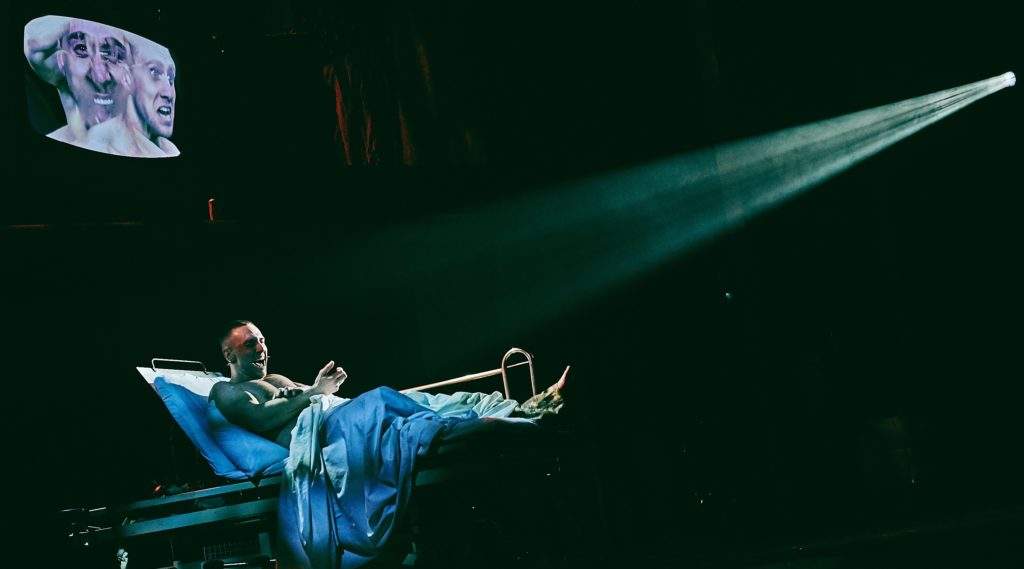
One of these things is not like the other: Will’s storyline is hardly comparable to the poignant physical/mental trauma experienced by Johnny and Tunny, and his character arc is far less persuasive than theirs despite a great performance from Samuel Pope. His baby mama Heather gets similarly short-changed in the narrative department, but Siobhan O’Driscoll stands out regardless with a truly impressive voice and a very sympathetic performance, especially in the lovely Last Night on Earth.
Joshua Dowen as Tunny gets perhaps the best character arc, starting out as just another brash upstart before the war leaves its mark on him physically and mentally. His beautiful performances of Are We the Waiting? and later Before the Lobotomy are utterly haunting, if undercut by the scene (Extraordinary Girl) that follows it. And Johnny, the self-proclaimed ‘son of rage and love’ who laments being ‘in a land of make believe that don’t believe in [him]’, is a vulgar hybrid of Joseph Gilgun and Iggy Pop. Swaggeringly played by Tom Milner, Johnny is a boldly dislikeable, grotesque portrait of 21st century adolescence who goes through a lot but seems to learn little by the end.
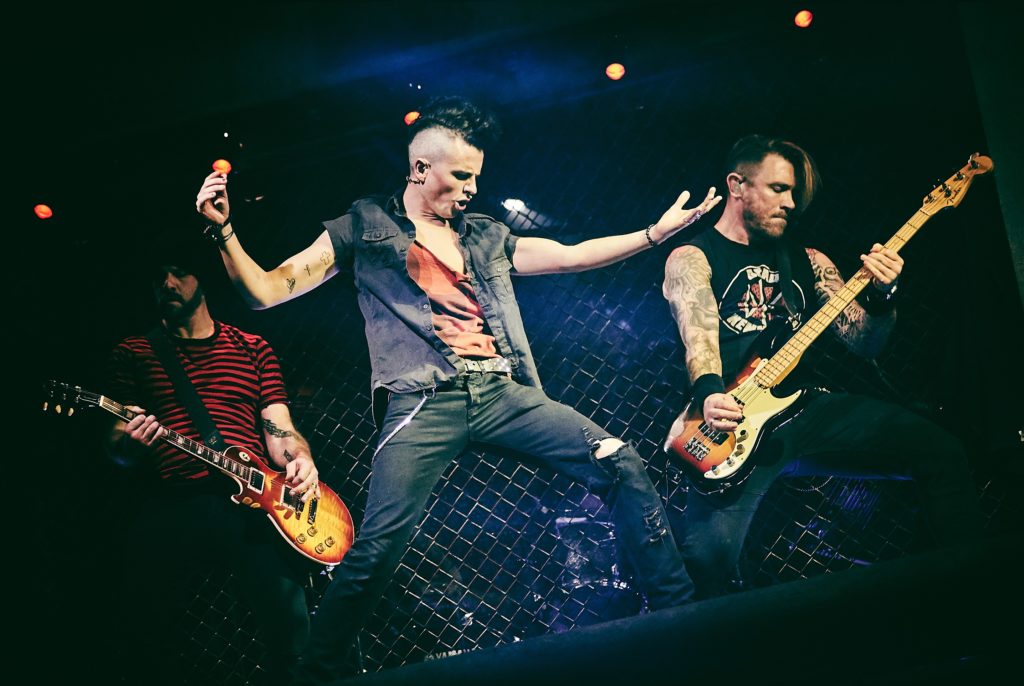
For its raucous anthems of youthful rebellion, American Idiot can be viewed as a modern-day Les Miserables or a twentieth century Hair (Hair Gel, if you will) that replaces barricade flag-waving with air guitar, grinding and a potent grunge aesthetic. Like Rock of Ages, it takes a little while for your mind to calibrate to its crassness, not to mention a set so purposefully grungy it makes you long to bathe in Clorox afterwards. Tosca, this ain’t. But once you wade into the mire, you’re in the zone and ready to stick it to the man. Combining songs from 2004’s American Idiot (as you might assume), 2009’s 21st Century Breakdown and a few tunes written for what is essentially a jukebox musical, the songs segue surprisingly well into a theatre setting, which maintains the raucous power of their anthems whilst enhancing their slower tunes with careful orchestration and stunning harmonies. However, it’s the nature of the jukebox musical that trips this up from the get-go, stemming from a cliché-ridden script that crowbars in a few emotional storylines which ultimately feel rather hollow.
The show is more about sensations than story; if you’re looking for narrative coherence, you’ve come to the wrong place. The news footage from the bygone Bush presidency is perhaps the only overtly political thing about the musical which (surprisingly for such an otherwise literal show) opts instead to show the social decay caused by such a system, and specifically how this societal dysfunction affects the working classes more than most. But the frequent tonal whiplash between scenes is jarring, and some of the songs are perfunctorily placed – American Idiot and Boulevard of Broken Dreams came way too early, Too Much Too Soon (ironically) came too late – but the strength and skill of the ensemble results in songs so brilliantly performed they transcend the material in which they are caged. And the band is utterly exceptional, performing with record-level quality and all-round excellence, even if they did drown out the singing at points. The show perhaps fares better when viewed as a pseudo-live concert experience in the same vein as This is Elvis.
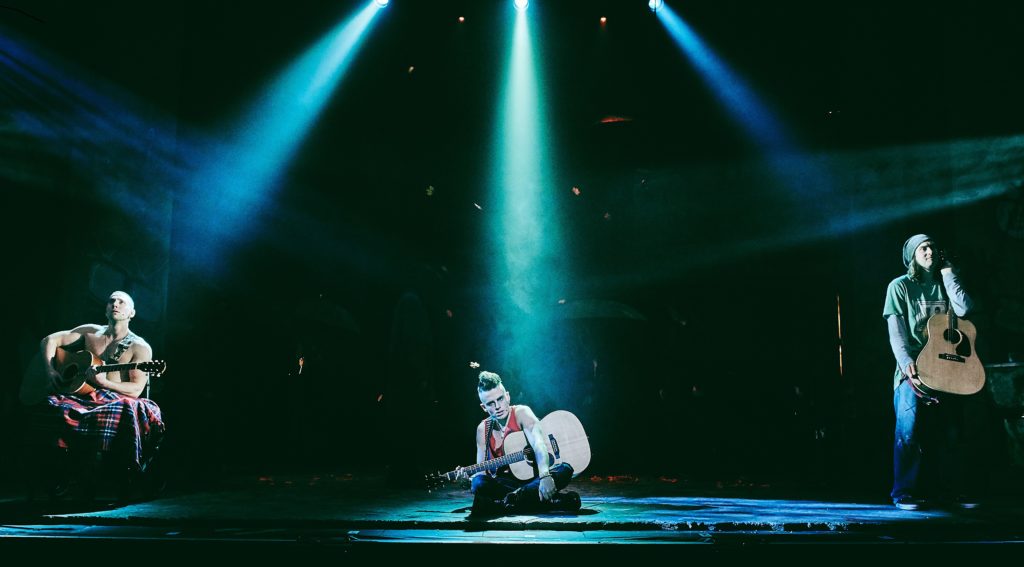
And the songs really are the standouts, coupled with fiercely energetic performances and gorgeous harmonies. Holiday is a deliciously rowdy anthem to ‘the dawning of the rest of our lives’, and Boulevard of Broken Dreams is intriguingly staged, with a stream of cloaked unknowns swarming around Johnny as he makes his way through the city. The ensemble imbues particular power to lyrics like ‘your faith walks on broken glass’ (21 Guns) and ‘kiss the demons out of my dreams’ (Give Me Novocaine); the ballad of lost love Whatsername gloriously crescendoes into a bittersweet climax, and Wake Me Up When September Ends, a magnificently melancholic ode to grief, is wondrously realised.
The characters are intentionally archetypical, to the point where all of womanhood is represented by a person quite literally called Whatsername. The Jesuses of Suburbia are screw-ups, St Jimmy is far from angelic and the characters exist on a sliding scale of unlikable to downright hateful. And despite its rebellious ambitions, the show’s anarchic nature is more trite than tough, in the same way that adding a chain to your belt makes you a punk-rock rebel. But when it rocks, it rocks hard – and that’s mainly down to St Jimmy, the manically charismatic Luke Friend, who acts as a personification of Johnny’s dark side, the seductive Satan to his Jesus of Suburbia. As ‘the patron saint of the denial’ and ‘the resident leader of the lost and found’, Jimmy brings a sense of lawless joy whenever he springs onstage, like Beetlejuice by way of Billy Idol.
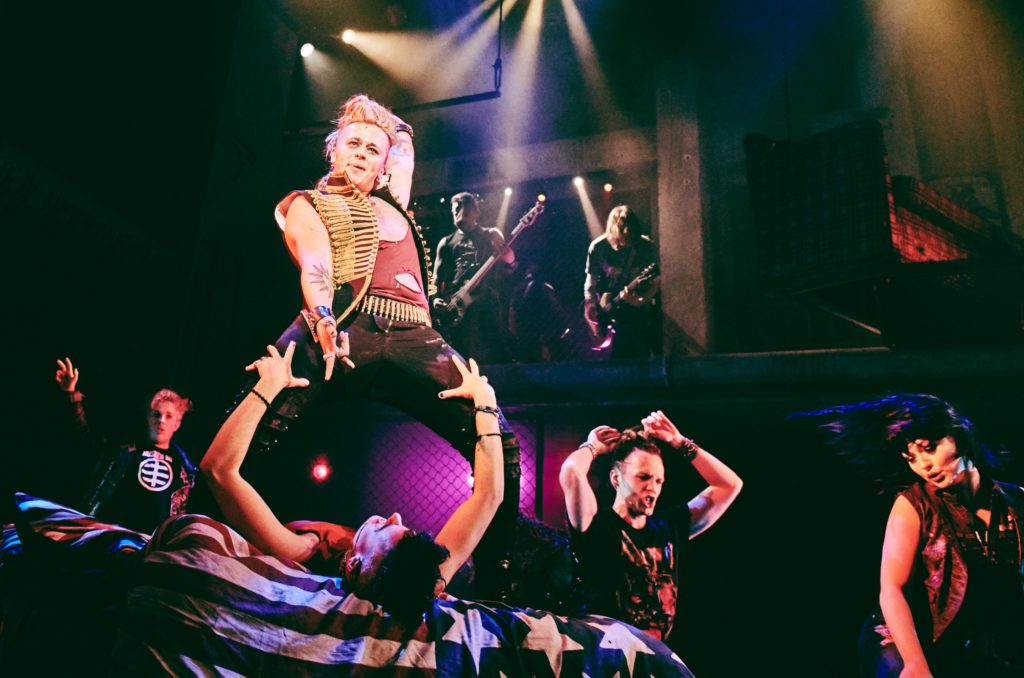
Despite the gaudy grunge trappings, from Sara Perks’ scrungy set to Tim Deiling’s Hadean lighting and the appealingly pop-punk wardrobe, the show has a lot of heart buried beneath the band tees. It’s a mephitic snapshot of post-9/11 America and the malevolence of bourgeois apathy to the rest of society, celebrating the riotous angst of those who rail against compliance to ‘The Man’. Ten years later and the songs, bemoaning the dangerous presence of a corrupt right-wing looney toon running the nation into the ground, are scathingly pertinent to our own fraught political climate.
Sadly, the show has a less than right on view of women, who are confined in the ‘well, actually…’ prison of the male gaze for most of the runtime, functioning interchangeably as nags and lovers until Sam Lavery’s compellingly enigmatic Whatsername (who, like Frankenstein’s creature, is denied the dignity of a title to call her own) is finally allowed to express herself (in an explosive version of Letterbomb) well past the halfway point. And when the women of Green Day’s America do get a moment to shine – during a sublime rendition of 21 Guns – it’s framed as a moment of emotional labour in which they must cater to the traumas of their man-child partners, without ever being given the space to deal with their own pain.
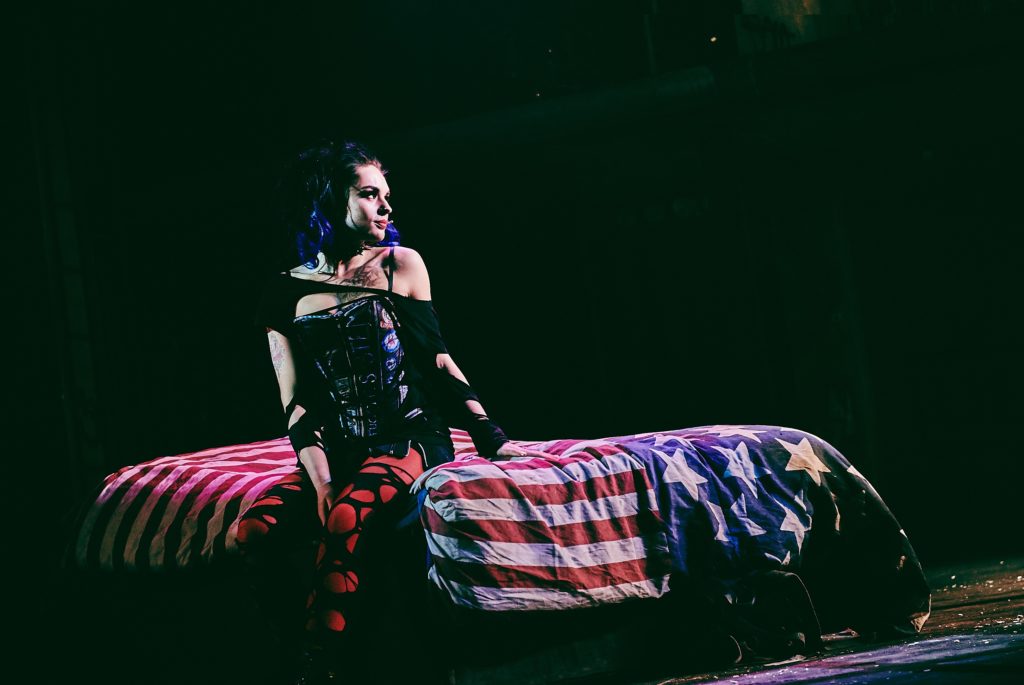
Visually interesting and politically engaging, American Idiot is an ambitious, defiant treatise to the restlessness of youthful discontent that is well worth seeing at least once in your lifetime, and a must-see for Green Day devotees like myself. Some of the characters may go to that great mosh-pit in the sky, leaving little closure for ‘the kids of war and peace’ who are left behind. But, as everyone on stage sings us out with the iconic Good Riddance (Time of Your Life), there’s hope. Chaotic, frenetic and miasmic, American Idiot isn’t quite the welcome to paradise you’ve been waiting for. But if you hitch a ride on this walking contradiction of a show, you might just have the time of your life.
